Last Updated on July 23, 2019
Aldi has really cheap eggs. Egg prices fluctuate constantly due to market variations, but sometimes Aldi’s regular Goldhen Eggs go as cheap as 48 cents per dozen. Most of the time, they tend to hover between 79 cents and $1.19 in my area.
Aldi’s cheapest Goldhen Eggs have a United Egg Producers Certification on the carton, which says the chickens that laid them are raised humanely, but if you want some other options besides the standard cheap eggs — such as cage free, organic, or free range — Aldi has them.
Here are your other three choices in addition to the bargain eggs at Aldi:
Goldhen Cage Free Large Grade A Brown Eggs
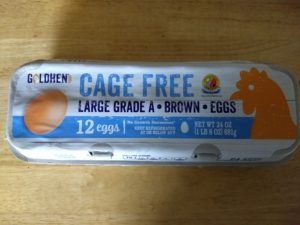
At the time of writing, these eggs cost $2.29 for one dozen. We bought these eggs when we tried Instacart.
The carton states these eggs are CA SEFS Compliant, meaning they are California Shell Egg Food Safety Compliant. This means they have gone through added measures to reduce Salmonella Enteritidis (SE) contamination.
The carton states these eggs from my Aldi store in the Midwest were packed at 1657 W. Tipton St. in Seymour, Indiana, which is the corporate headquarters for Rose Acre Farms. Rose Acre Farms, which also produces Aldi’s regular, cheap Goldhen Eggs, is the second largest egg producer in the United States.
Rose Acre Farms’ website states: “All of our cage-free facilities are American Humane Certified to meet or exceed standards for cage-free living conditions.”
Be aware that cage free does not mean the chickens have access to the outdoors. It means they do not live in cages, but they still most likely live inside large barns.
One Goldhen Cage Free Egg equals 70 calories, 1.5 grams of saturated fat, 70 mg of sodium, 0 grams of sugars, and 6 grams of protein. One egg also has 6% of your daily value of Vitamin D, 2% calcium, 6% iron, and 2% potassium.
Simply Nature Cage Free Organic Large Brown Eggs
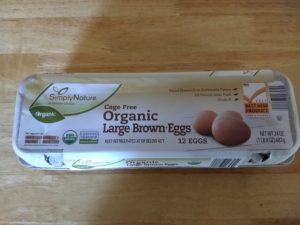
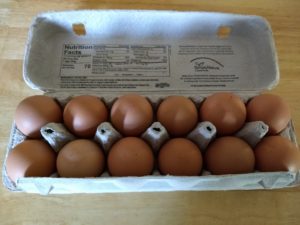
These cost $3.49 for one dozen at the time of writing. The carton states the chickens are raised humanely on sustainable farms and are fed an all-natural grain feed. The carton also says the eggs are Grade A and USDA Organic, certified organic by Midwest Organic Services Association (MOSA), and the carton says the chickens are “certified humane” in the way they are raised and handled. The carton also states the eggs are produced without the use of hormones, although federal regulations don’t allow the use of hormones in the production of chicken, so that label causes confusion among consumers.
According to the carton, these eggs were voted by consumers as a “Best New Product” in 2017 as part of the BrandSpark Best New Products Award survey and real user feedback from Shopper Army.
There is no information on the carton anywhere stating where these eggs were packed or produced. All of Aldi’s other egg options have this information on their cartons, so it’s a bit puzzling and frustrating that we have no idea where these eggs come from or who oversees their production.
The inside flap on the carton says, “The Simply Nature Cage Free Organic Eggs come from cage free hens that are fed an all-natural, organically grown vegetarian diet. Simply Nature cage free hens live in spacious barns where they have access to the outdoors.”
A vegetarian diet is common now among grocery-store eggs, but chickens are naturally omnivores, meaning they eat plants and meat (insects, frogs, and even mice). Some writers point out that vegetarian feed is popular because it reduces the risk of transmitting latent animal diseases via poultry feed, and customers often think “vegetarian” sounds healthier, but it’s not what hens actually prefer.
Regarding the chickens’ access to the outdoors, the definition of “outdoors” can be different depending on the operation. Sometimes it means the hens actually set foot on soil, and other times it means they only go onto a covered porch. The Organic Consumer’s Association states to “be wary of retail grocery chains that sell ‘organic’ eggs under their own label, including Aldi’s Simply Nature, Whole Foods 365 Organic, Trader Joe’s, Kroger Simple Truth, Costco, Walmart, etc. Most of these store-brand eggs are produced by industrial-scale organic producers.”
The inside of this egg carton states the eggs meet “the Humane Farm Animal Care Program standards, which include nutritious diet without antibiotics, animals raised with shelter, resting areas, sufficient space and the ability to engage in natural behaviors.”
One Simply Nature Cage Free Organic Egg equals 70 calories, 65 mg of sodium, 1 gram of saturated fat, and 0 grams of sugars. One egg also has 6 grams of protein, along with 6% of your daily value of Vitamin D, 2% potassium, 2% calcium, and 6% iron.
Goldhen Free Range Large Grade A Brown Eggs
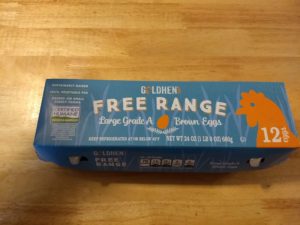
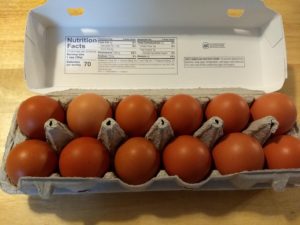
These eggs are the newest among egg choices at Aldi. I’m not sure when they hit store shelves, but I first noticed them in April of 2019. I could be wrong, but they appear to be a Regular Buy that will be in stores all the time because I did not see a label on the price sign indicating that they are a limited-time ALDI Find or Seasonal Favorite. They are produced in the region where I live (more on that in a bit), so I’m not sure if they’re available at Aldi stores everywhere in the U.S. or just in my part of the Midwest. They cost $2.69 per dozen but were on sale for $2.39 at the time of publication.
The carton states they are sustainably raised on small family farms and are 100% vegetable fed (read more about how chickens are not vegetarians here and here), but I’m not sure how they can be free range and also eat an all-vegetarian diet. Somehow that does not add up. The carton also states the eggs are gluten free, but since all eggs are, it’s honestly silly to print it on the carton.
Like the Simply Nature Cage Free Organic Eggs, these free range eggs have a seal indicating they are Certified Humane in the way they were raised and handled. The package states the eggs meet “the Humane Farm Animal Care Program standards, which include nutritious diet without antibiotics, animals raised with shelter, resting areas, sufficient space and the ability to engage in natural behaviors.”
The carton says the eggs are packed in Smithton, Missouri, and Berryville, Arkansas. A Google search for those two locations along with the word “eggs” displays the website for Mid-States Specialty Eggs, which raises free range, cage free, pasture raised, organic, and non-GMO eggs.
Their site states: “Free Range Eggs are laid by Hens that have access to the outdoors. Every morning (weather permitting), each hen is free to walk outside to feel the warm sunshine on her face. She is free to spread her wings, run, forage for insects, and take a dust bath.”
Again, if the hens are foraging for insects, they are not 100% vegetarian fed as advertised, although, again, hens are naturally omnivores.
A document listing standards for free range hens to be Certified Humane states that they are “kept in houses with daily access to an uncovered outdoor area weather permitting. The minimum outdoor space requirement is 2 square feet (0.19 square meters) per bird.” It also states the outdoor area should “consist of ground covered by living vegetation where possible.” Additionally, the outdoor area must have sufficient shade and cover, and “outdoor access must be provided for a minimum of 6 hours per day during the daytime, except during inclement weather or for veterinary or emergency reasons.”
Overall, if you’re concerned about animal welfare and allowing chickens to live like chickens should, and if you’re not buying eggs directly from a local farmer or at a farmers market, these free range eggs are probably your best option at Aldi.
One Goldhen Free Range egg has 70 calories, 1.5 grams of saturated fat, 70 mg of sodium, 0 grams of total sugars, and 6 grams of protein, along with 6% of your daily value of Vitamin D, 2% potassium, 2% calcium, and 6% iron.
The Verdict:
Keep in mind that we think every Aldi egg we tested tastes more or less the same. That said, if you’re concerned about the welfare of the chickens who lay the eggs, Aldi has other options besides its cheapest, basic Goldhen Eggs.
Aldi sells Goldhen Cage Free Eggs, which come from chickens that do not live in cages but are probably raised inside large barns.
Aldi also sells Simply Nature Cage Free Organic Eggs that come from hens that have some form of access to the outdoors, although the exact definition of outdoor access can be unclear in the poultry industry, and in some cases such chickens just have access to a covered porch; it’s not clear what type of outdoor access the chickens that produce Aldi’s eggs have.
Finally, Aldi also sells Goldhen Free Range Large Grade A Brown Eggs. These hens have access to the outdoors, and the carton states they are raised by small family farms. They seem to be the best option at Aldi if you’re interested in animal welfare.
All of these egg options are improvements over chickens raised in crowded cages, although they are not the same as buying eggs directly from a farmer or from your local farmers market that have been produced by pasture-raised chickens.




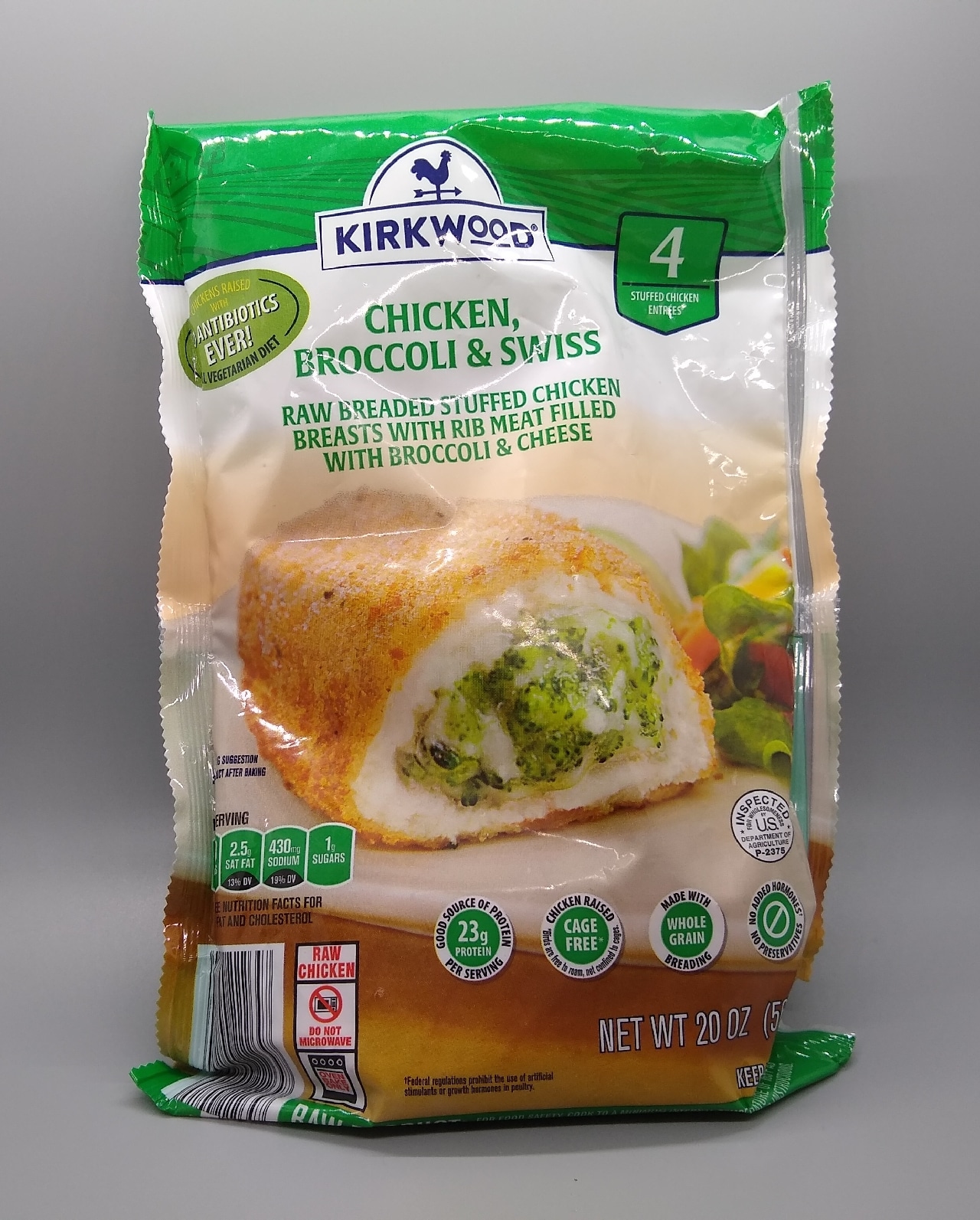
I bought a box of Goldhen Free Range eggs from Aldi, for the first time.
They were dated SELL BY 09-07-19
On SEPT 1ST – I put them in a pan of cold water to boil for a later lunch.
Of the 8 that I put in the pan, only 1 laid lenthwise on the bottom (true sign of a fresh egg). The other 2 lifted to a 45 degree angle. Older, but still fine.
The other 5 stood on end… sign of an old egg (a bad egg will float), and 2 of those lifted from the bottom of the pan just slightly. I didn’t use any of them and threw them out. Seven days before they were marked Sell By, they were already quite old. I will NEVER buy these eggs again and will rely on brands that routinely test fresh.
You can let Aldi know at http://www.aldi.us/contact/. Also, you can return the eggs for both a refund and a new package if you wish.
I recently purchased the Simply Nature organic eggs. I don’t know what they are feeding those chickens, but these are the most anemic looking eggs I think I’ve ever seen. I usually purchase locally raised chicken eggs and have myself raised chickens for eggs. Yokes should be orange, not barely yellow. I don’t believe these eggs come from humanely raised and fed birds and will not be purchasing again.
Exactly. If the yokes are yellow and not orange, they aren’t really getting any quality outdoor time. And ONLY eating grain instead of being able to eat some worms and grubs is not the best diet for chickens. I tried one carton but I will be going back to “Happy Eggs”.
Contrary to the two posters above, the cage free organic eggs, I ate this morning (February 26, 2021) had the orangiest egg yolk color I have seen in a very long time. So orange, in fact, that I thought they may have been dyed with the natural color of marigold flowers, which, I understand, is common in the egg industry. i made scrambled eggs and they were absolutely delicious and very fresh tasting.
Hi Marie, which brand did you get at Aldi? Thanks
How would they dye a yolk that’s inside a shell? That makes no sense.
They don’t dye the yolk that is inside the egg. They use a marigold dye derived from marigold flowers, which is orange, to dye the grain which they feed the chickens. This is what makes the yolk orange. From what I have read, this is perfectly legal and safe and a lot of egg producers do it.
WOW, that’s an eye opener! I had no idea such a thing could be done, let alone legally! If that have to do that, the hens don’t have enough access to proper “hen lifestyle” Thanks for the information!
Hello Yolanda. It has been such a long time that I posted that comment that I am not sure, but I think that it was probably the Simply Nature cage free eggs
Goldhen’s pasture raised egg is a JOKE.
90% of those yokes are pale yellow instead of deep yellow in color…I’m very disappointed and feeling ripped-off!
I bought Goldhen Free Range Eggs and the yolks are not orange like they should be!
Thanks so much, Rachael! I was looking specifically for a review on Aldi eggs I have long taken issue with the bragging that hens are fed a vegetarian diet~as you said, that is not natural for them Also, I know that “free-range” can still be restrictive Your post (and the comments) have been very informative!
Glad to be of help!
My reaction was the same as many here with the Simply Nature eggs from supposedly free range chickens. I have never had eggs as pale as these from a free range chicken. I’m also questioning the Simply Nature free range whole chicken. I have bought three whole chickens over the course of several months. Each was SO FATTY and extremely tender when roasted with a dry rub, almost mushy. I wrote to Aldi asking if they have visited and verified the authenticity of the farms and product claim of free range. They replied: “It is important to understand this information may vary for this product from time to time and by region due to differing product suppliers and formula changes. While we can confirm the information provided above is accurate based on the specific product information you provided at this time, the nutritional information may not be the same for all product nationwide or for future product purchases. We encourage consumers to check both the ingredient list and contains statement each time they buy a product.” Ummm…what? I have also alerted Aldi in the past to the documentary about Fairlife Milk. Fair Oaks Farm (a milk provider to Fairlife) employees were filmed abusing cows in the most hideous ways. It’s so disturbing. I used to love shopping at Aldi, but they need to do their homework and do a better job at answering our inquiries.
I said the eggs were by Simply Nature, but they were the Gold Hen free range eggs.
What are the details on the eggs I just purchased at Aldi:
“ Pasture raised eggs”?
Why are the yolks in the Goldhen Pasture raised eggs at times not orange? This has happened to us 3-4 times in the past few months, early spring and early summer.
I would like to know what the chickens are fed when they are “pasture raised”
It says vegetarian feed ? What is exactly is that? Pasture raised is supposed to be chickens feeding on grass and bugs not soy and corn and grain.
how can we find out what golden hen
Pastor raised chickens are feeding on? Is there a phone number for Golden hen that we can ask directly?